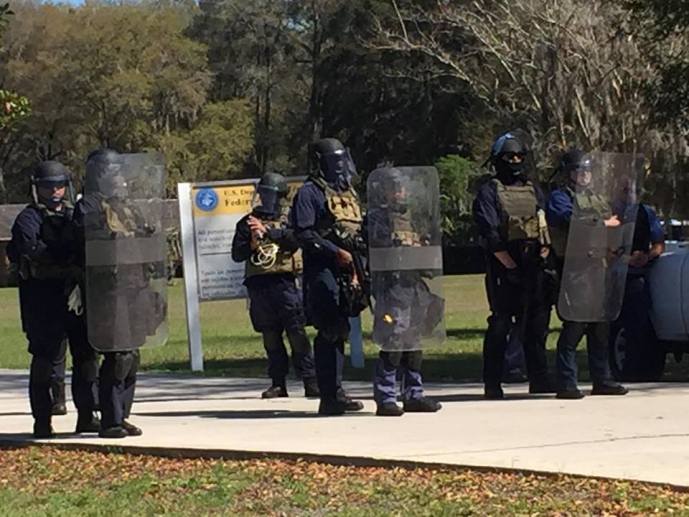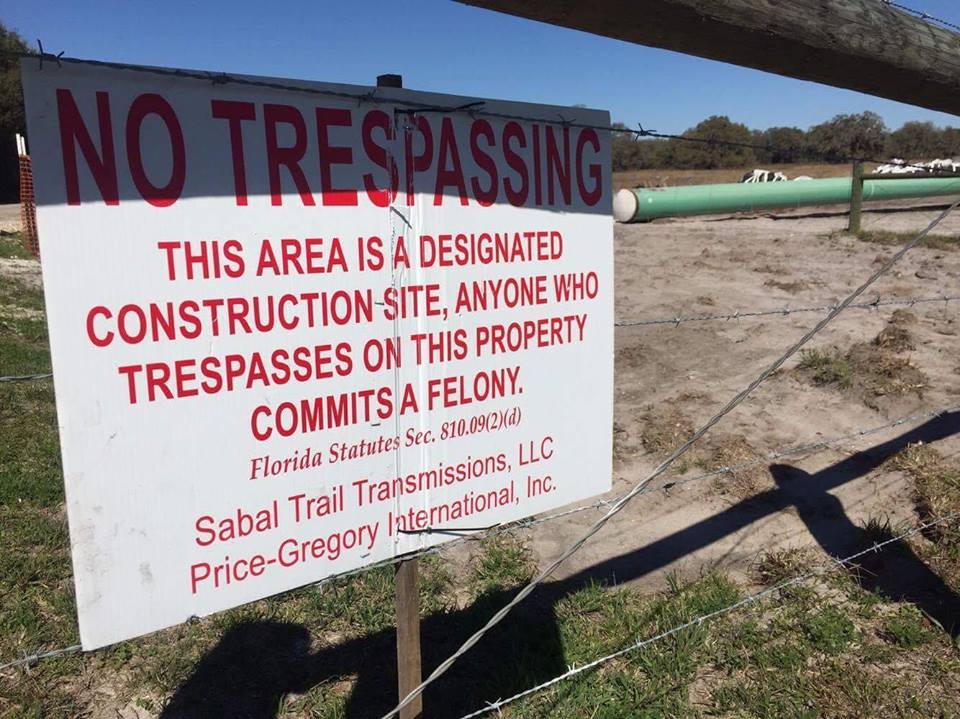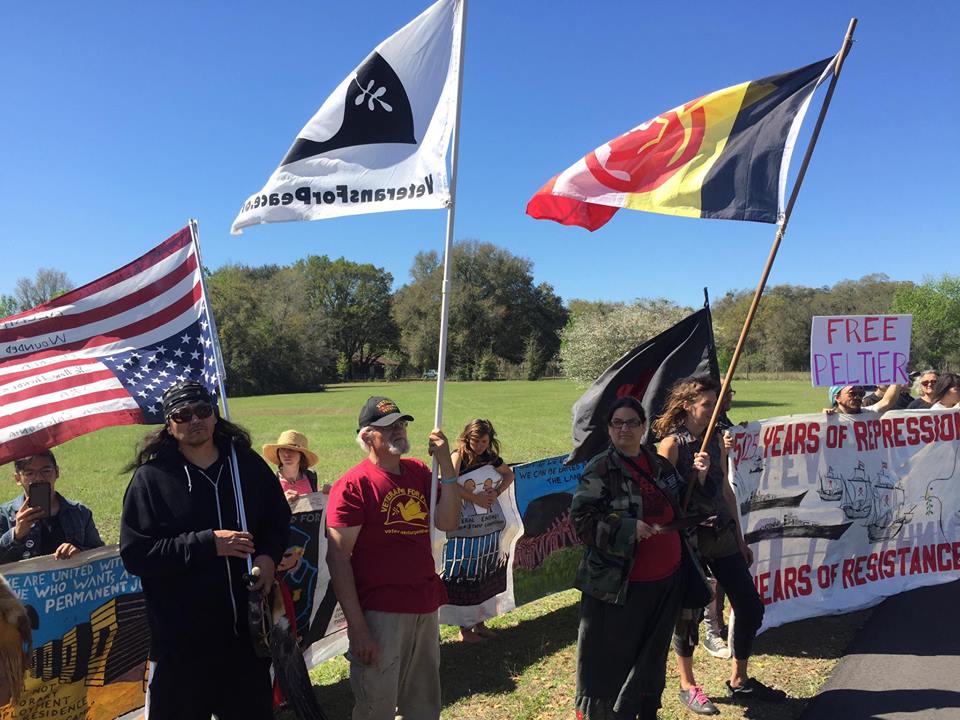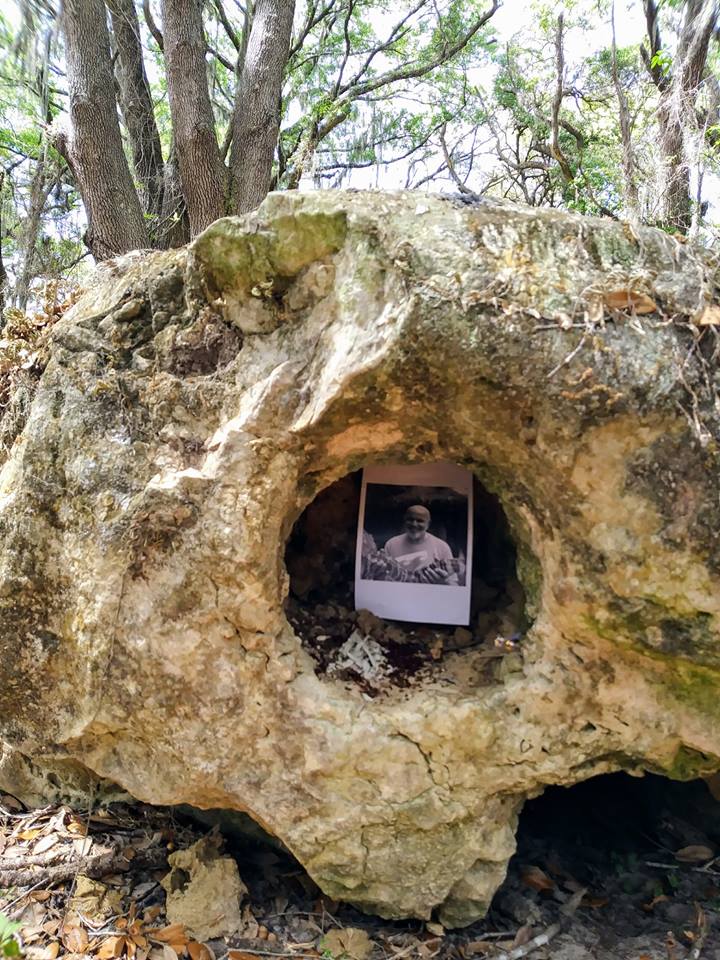Filed under: Analysis, Capitalism, Civilization, Featured, Police, The State, US
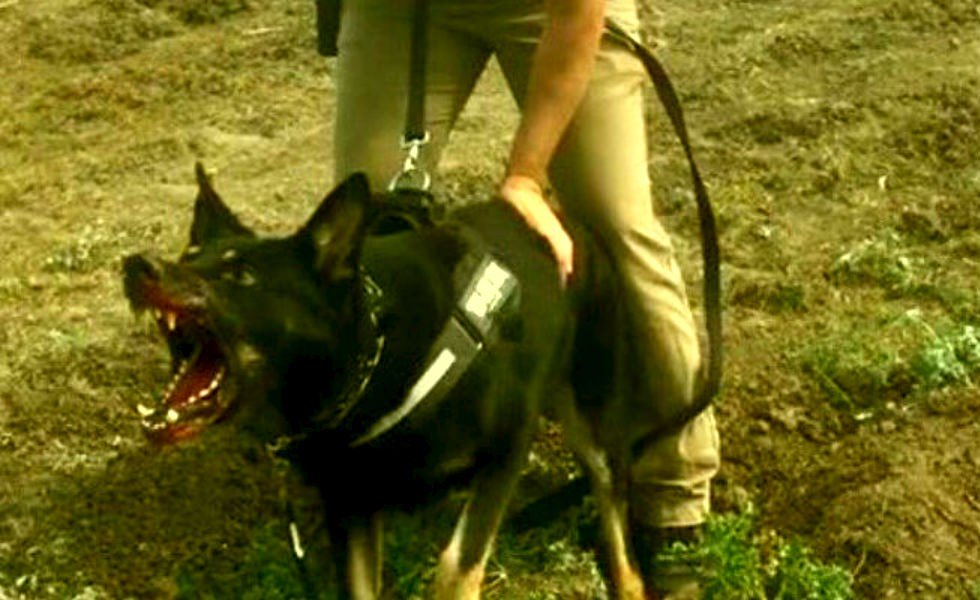
I’ve found my mind in a frequent state of confusion and sadness over the police killing of pipeline saboteur Jim Marker since it occurred a month ago this weekend. While stories of police brutality and mass repression, like the sort that has been occurring over the past year against the #NoDAPL camps, are always infuriating, the police permanently taking someone in our midst leaves a haunting chill.
Marker’s death hit very close to home for those of us who have dedicated much of the past 6 months to stopping construction of the Sabal Trail pipeline. Jim was murdered by Citrus County Sheriffs on the morning of February 26, 2017, as around 50 activists stood in front of the Coleman federal prison complex in the neighboring Sumter County.
The group I have been organizing with, Sabal Trail Resistance (STR), called for the demonstration at Coleman as a joint endeavor to express solidarity with American Indian Movement activist Leonard Peltier locked up there and to draw attention to the pipeline which passes within about 2 miles of the facility.
Along with that demonstration, STR had encouraged people to commemorate that weekend, the anniversary of the Wounded Knee ’73 Stand-off, with anti-pipeline resistance. I didn’t know Jim Marker, but I know others who did and based on what I’ve been able to learn about him, I suspect that he may have been responding to that call. I think he also likely picked the spot that he damaged the pipeline based on a civil disobedience blockade that occurred days earlier where people put their lives and freedom on the line to shut down construction by locking themselves to a concrete box over 200 feet inside the pipe.
After police responded to a report of him damaging pipeline equipment less than a mile from where the pipe occupation had occurred, they located the car suspected to be his and initiated a high-speed chase that ended in him being run off the road and shot to death. The only hope of knowing what really occurred that day lies with the Florida Department of Law Enforcement’s decision to release records from possible dash cam footage. A representative of the Citrus County Sheriff’s Office (CCSO) told me there was no indication of this happening anytime soon.
While being associated with Jim Marker’s actions has been a heavy weight to carry for our small group, entailing scrutiny from law enforcement, media and other activists, it is something we knew we could not shy away from. I feel very thankful to be part of a group of people who had the courage to respond immediately to his killing and follow up by hosting an open community memorial Sunday, March 26. Some organizers involved with opposing the Sabal Trail pipeline have chosen to condemn Jim Marker’s actions as violent (though no one else was injured), others have chosen to celebrate him for causing an effective delay of construction, but I’ve found that the more important responses to engage with are people who are feeling conflicted, uncertain, afraid or paranoid.
After fielding a month of questions and comments, in person and online, I’ve realized that there is an important movement responsibility to engage with people about matters like this in order to work through some divisive tendencies that can have damaging impacts on our work. These moments are a call to deepen our collective courage and actively challenge the paralysis that fear can bring if its is left to fester.
For starters, we need to diligently question and scrutinize the reports of the law enforcement agencies and the media’s use of them. For example, in Marker’s case, the first statement released by CCSO implied a shoot-out which some news outlets reported as Marker firing at officers. In subsequent statements, CCSO confirmed that this did not occur.
While Marker’s action was bold, it was not unique or unprecedented. There is a long history of sabotage being used as part of a broad resistance effort, among the most famous being the Boston Tea Party of the anti-British revolutionaries. Countless examples exist over the past two centuries of social changes in this country and abroad. Some involve groups of people engaging openly in property damage and others more clandestine activities. Over the past month alone, for example, there have been numerous reports of pipeline-related sabotage in various states.
A dialogue around “violence” is not relevant without context. While the only violence that actually occurred was against Marker by the police, the involvement of a rifle in damaging pipeline equipment seems to have left some people with a feeling that the potential for violence existed. While that could be an interesting philosophical debate, it is useless speculation. The most common uses of guns are not for things that fall into a category of violent crime, but for a variety of non-criminal activity including recreational sport, hunting for food and self-defense. STR has argued that Marker’s action can be viewed as an act of “self-defense” to protect himself and others from the pipeline that has stolen peoples land and damaged the environment that people depend on for life.
But even if firing a gun was something that was considered violent, it would be an extreme contradiction to claim that only some entities are justified in the use of it. As most know by now, Marker was a military veteran. Whether one agrees with the military or not, Marker was most likely trained with public tax dollars to use guns to enforce whatever the government claims to be a just cause. But most can agree that the state does not have a monopoly on the concept of justice, as the histories of anti-slavery, civil rights, labor unions and women’s suffrage can attest to. Is it much of a stretch to view oil and gas pipelines as the aggressors in a conflict that represents an extreme travesty of justice?
Perhaps most importantly: the general role of the police cannot be ignored. There has been a steady stream of uprisings across the country over the past several years that have succeeded in exposing the police for the widespread use of excessive force, including the killing of children at playgrounds (as was the case with Tamir Rice in Ohio). But the problem with police is not just that they kill with impunity. The more common travesty is that they hold millions of people in cages, and they’ve been doing it for a long time. And it has everything to do with our effort to protect the Earth from the energy empire. The fear of prison and police violence is the primary obstacle that keeps people from stopping corporate plunder in a direct and effective manor.
While Jim acted alone last month, he acted in the context of thousands of like-minded veterans who joined the front lines of a pipeline battle at Standing Rock in North Dakota, declaring that their oath to protect this country included standing up for the water and those who protect it. And he was killed in the context of a nationwide epidemic of state violence, where police are able to kill with impunity, despite the steady flow of protests and uprisings that have occurred in response to police killings.
An Amnesty International report from 2015 indicated that not a single state in the U.S. has laws that meet international human rights standards for “use of force” by police officers. Though Florida is among the only eight states in the U.S. to require a verbal warning by police officers before shooting, there is no evidence to indicate if this occurred in Markers’ case.
In a letter contributed to the Jim Marker Memorial Site by well-known military veteran and activist Brian Wilson:
[Marker] was the 209th civilian killed by US police in 2017, an average of 3.7 civilians killed per DAY. This continues the pattern of more than 3 civilians killed by US police per day over the last few years. To appreciate the staggering disparity between police killings in the US and other countries, in England and Wales combined, police killed 55 civilians over a 24-YEAR period, 1991-2015, an average of 2.3 per YEAR. In the first 24 DAYS of 2015, US police killed 59 civilians, an average of 2.7 per DAY, actually less than the higher averages for 2016 and early 2017.
In contrast, pipeline owner Spectra Energy and its partners NextEra Energy and Duke Energy, and investors that have included the governors of Georgia and Florida, continue to operate with impunity protected by local police despite having been cited numerous times for violating federal safety laws and regulations, deer poaching, transgressing sacred graveyard protections, and gross negligence in pipeline safety leading to pipeline ruptures.
So James Leroy Marker is another civilian victim of those seeking to protect the sacredness of our ecosystem while the lawless plundering of the earth continues with impunity with collusion of police and corporations.
We know the U.S. was founded on genocide, environmental injustice and mass incarceration. Not long after the wars of Manifest Destiny had spread from coast to coast, this nation incubated what would become the global dominance of oil and gas companies, fortified by the last century of war around the world—driven by corporations and paid for with tax dollars. What started as prisoner-of-war camps for indigenous people refusing relocation turned into the modern Indian Reservation system, and set the precedent for how to deal with rebellious elements in the growing empire and blossomed into the world’s largest per-capita prison population.
It should come as little shock to me that the tradition of merging state repression and corporate plunder would continue in the pipeline battles of today. But it doesn’t. It still shocks me when the police brutalize, imprison and kill people to defend the economic interests of the extractors. The thousands of people shot with water cannons in the freezing cold at Standing Rock, hundreds facing criminal charges, dozens hospitalized, in attempt to stop the Dakota Access Pipeline over the past year. Its one moment in time among over 500 years or repression and resistance.
On March 6, 2017, the Suncoast Standard, a local news outlet in Citrus County asked in an article on Jim’s death, “Will the Sabal Trail Pipeline Resistance denounce the actions of James Leroy Marker?” We didn’t respond formally, but I’m proud to say, on behalf of STR: no, we will not.
On a personal level, as sad as I am over the loss of Jim Marker, and as angry as I am that the police took him from us before I had the chance to get to know him, I choose to direct those feelings into deepening my commitment to draw out these connections between pollution, police and prisons. I commit to intensifying my dedication to this struggle. I will do what I would want done in my honor, if I was to face a similar fate at the hands of the police. Because that’s the responsibility that comes with being part of a movement.
Tsolkas has written extensively on the “police vs. planet” theme, including: “The Ecology of a Police State” after cops in Miami killed a young graffiti artist for vandalizing a McDonald’s in 2013; “Prison, Ecology and the Birth of an Empire” in the build-up for the 2015 Resist 450 action in St. Augustine, Florida; and is co-author of “From Pipelines to Prisons” on the intersection of native rights, mass incarceration and environmental justice.


